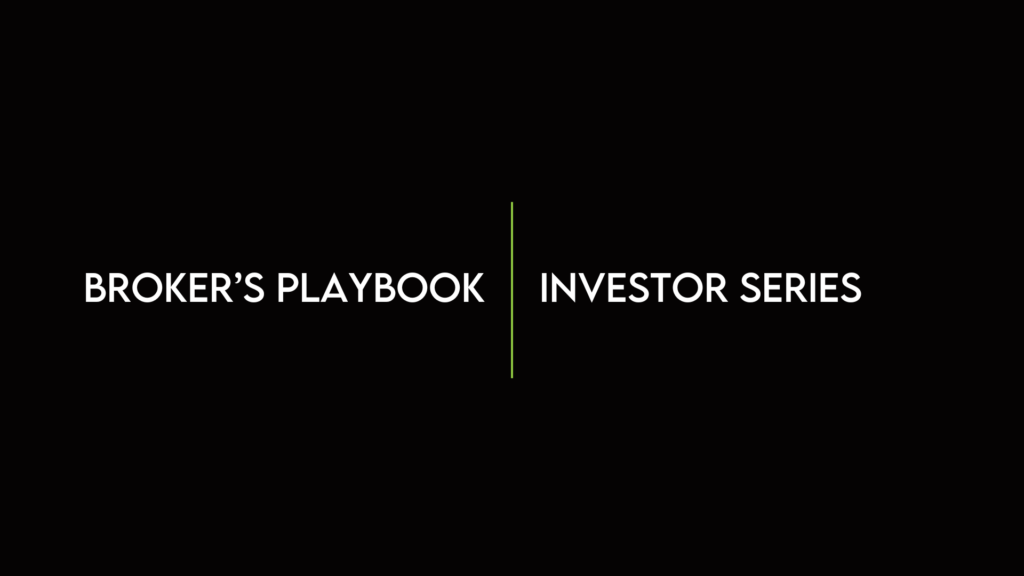Welcome to Broker’s Playbook! Today I’m joined by Denise and Nicolee of Lafromboise Mortgage to discuss the current market conditions and how to navigate them. Get insights from top professionals on renewing mortgages during this unprecedented time, learn tactics that will help your business grow, and find out how to help your clients live better lives. Don’t forget to like and subscribe!
Simeon Papailias: Welcome back everyone, to Broker’s Playbook. I have the pleasure of introducing Denise and Nicolee of Lafromboise Mortgage today on the show to discuss the current market conditions and the current environment that has a tremendous amount of consumers and clients stressed and anxious on how to renew their mortgages and what to make out of this very unprecedented, I suppose, market that we’re navigating through. Stay tuned for current, insightful and tactical insight that will help your business grow and help your clients live better lives. Denise and Nicolee. Welcome to Broker’s Playbook.
Denise Laframboise: Thanks for having us.
Simeon Papailias: It’s my pleasure to have you. I’m very excited for today and I’m excited to have you on. I’ve actually was speaking to my team the last few days on what route to take with you today. And we all kind of came to the conclusion that the market today is the most confused it’s ever been in our experience.
Denise Laframboise: I do agree with that.
Simeon Papailias: I’ve been in this going on 17 years. I want our audience of brokers and investors at this point to hear a little bit about your past. How long you’ve been in the business, the things you do for the industry. Let’s just start there as to why should someone listen to Nikolay and Denise and let’s get into the Canadian market, which is a lot to unpack right now. Oh, yeah. Nikolay, why don’t we start with you? Sure.
Denise Laframboise: I’ve been in the mortgage industry for seven years now. We started coming off different types of careers. I used to work in public relations, and I came into brokering from a perspective of wanting to make a difference, having different experiences with my home, buying processes and mortgage acquiring processes, and felt that this was something that I could do. And through my career, we’ve developed a specialty in helping people who are self-employed and doing some of the more tricky things in the mortgage industry alongside Denise.
Simeon Papailias: Denise.
Denise Laframboise: Yeah. So I started seven years ago as well. Nicolee and I took the mortgage.
Denise Laframboise: Agent course together. I came from health care, but I was a property investor.
Simeon Papailias: And so that’s what brought you into the industry. Being an investor.
Denise Laframboise: Yourself, it made it easier. I was always looking for answers that people didn’t seem to have for me, and I knew that there were answers out there and I wanted to provide a better quality of service to consumers in Canada.
Simeon Papailias: Investor specifically is a big subject for me because I have this country’s biggest investment focused real estate team, meaning that the majority of our transactions, of course, we transact regular real estate buying and selling homes. But I specifically am a commercial broker by trade and about half my team focus on investment for the purpose of profiting, of investing their hard earned money and growing it over time in the safest asset class possible. There’s a couple things you said, specifically, Nikolay, that you specialize in business for self. There’s then you said investor. These are two of the biggest pain points in this country today. Although the economy has changed so drastically and specifically the interest rates and the cost of money that everybody’s feeling, the hurt business for sale specifically, though, have been. And has been known to be the the type of applicant that is almost punished for being an entrepreneur.
Denise Laframboise: Absolutely.
Simeon Papailias: The banks are.
Denise Laframboise: Definitely underserved in the industry.
Simeon Papailias: And we’re talking because I am in business for self. All of us are.
Denise Laframboise: Of course.
Simeon Papailias: When advising clients, there’s nobody that knows, Oh, you work for yourself. Okay, So right there it starts with a negative connotation as to what their options are in the Canadian financial landscape.
Denise Laframboise: At some places, right when they come to us, you’re like, Oh, you’re incorporated and you have a great accountant who hides your money. You’re my people. Yeah, I know how to help you because I do this for myself.
Simeon Papailias: Denise, you’ve been in the business for seven years. You see business for self, you see investors, you see all different sorts of applications. Starting with investors, what do you see an investor, What is the biggest need and the biggest expectation and investors should have from their mortgage broker? And then of course, how does the mortgage broker address that segment of the market?
Denise Laframboise: Yeah. So when we’re talking about investors now, we’ve always talked about cash flow, right? We’re looking at properties that cash flow well with all these increases, especially when a lot of investors are using a line of credit for a down payment, it’s killing people. It’s really hard to cash flow a property well. So we’re looking at different solutions. Sometimes it’s an interest only payment, sometimes it’s looking at mortgages with no payments. It’s looking at how we can maybe stretch out the amortization to be able to survive this time where rates are higher, some people end up selling their properties, maybe they’re buying new ones that they can get tenants in for higher costs. And it’s really just working with a broker or having the brokers themselves look at all the options because there are clients that we run numbers for and say, You know what? If you sold and bought another property at a similar price that was vacant, rents have gone up a lot. It’s really looking at the full picture and not just, Hey, what can we renew you for, but what else is there out there that can help you?
Simeon Papailias: Do you help your clients underwrite their own deals? Do you give them advice from a perspective of this is where you’re performing today and your options today? Should this change here? Should you improve and re rent? Etc. Or do you take them through the full spectrum of of the investment when underwriting?
Denise Laframboise: Absolutely. Yeah. And we do that for our investors as well as the self-employed people, because not just the investors planning their portfolios, but if you’re self-employed, maybe you need to figure out how much you need to t for yourself next year out of your core to qualify within a lender. Or maybe you don’t care about that. And we can write off everything because we have enough expenses to qualify with a lender. Or maybe you make cash income that has to go through a bank account so we can see it. It’s really looking at all of the options and then what that individual can do to best help those options for themselves.
Simeon Papailias: That’s very interesting. Nicolee, I’ll take this one to you for business for Self. Denise mentioned thinking forward, meaning that if you’re thinking of buying an asset for investment or for yourself, you might need to change the way you t for yourself. Let’s unpack that because there are so many negative connotations specifically in the media the last quarter where people are like, Oh, I’m doing fake paperwork. Mortgage brokers don’t have this, that or the other. Yeah, the strategy that we’re talking about is not creating fake paperwork. What is so planning forward instead of being in a specific tax bracket now you do your accounting differently. Yep. And then if you’re going to be buying an asset that, you know you need to qualify for. Exactly. You speak to someone like yourself to do what?
Denise Laframboise: So and it’s interesting because there’s a lot of crossover between investor clients and business for self clients. When you are business for self, you don’t have the pension in place, so you’re looking for different strategies to build your wealth. And when we have a client who’s self-employed, who comes to us and wants to make a purchase, whether it’s the primary residence or looking to get a rental property or two, we look at their business financials. We do a full holistic look at what they’re doing now, how their business is growing and how much they’re offering themselves. So to be clear, there is no creating documents here. There is no, you know, falsifying anything. It’s just different strategies of.
Simeon Papailias: How to.
Denise Laframboise: Package it, how to package it. Because an accountant who is also specializing for business for self, their number one goal and any accountant will tell you this is to have their clients pay the least amount of taxes possible. That’s their job. For us as mortgage professionals, our goal is to qualify you for as much mortgage financing as you can or you want. These goals are not necessarily aligned at all times.
Simeon Papailias: They’re actually kind of polar opposites.
Denise Laframboise: They are a bit.
Simeon Papailias: What is evading the.
Nicolee Evans: Other. Exactly.
Denise Laframboise: So what we like to do is from the second we get a client and we do get a lot of clients from accountants, which is a lovely symbiotic relationship, is figure out their goals for right now and into the future. So if they have been running a business that’s profitable and they’ve only been offering themselves a small amount, that’s fine. You’re paying less tax, but you’re going to qualify on the B side, which gets a bit of a bad rap. But honestly, B lending makes a lot of financial sense. If you look at cash flow, if I have a client who. Who’s throwing themselves. The minimum to pay the taxes, but they’re retaining earnings in the business and they have really robust business financials. There’s a lot of options there.
Simeon Papailias: So so what I’m going to do, I’m just going to do a quick pause for everybody who does not understand T4 versus retained income for self-employed when you have a corporation. If you keep the money inside your if your business is busy, you do $300,000 in sales. You can pay yourself a salary of 50,000 a year to pay minimum tax at the highest rate. By keeping the money in your corporation, you’re going to pay a maximum of 12, 14, 16, 18%, depending on what bracket you fall in. However, when you’re applying for a personal mortgage, it’s your personal income that matters. So these ladies are saying when we’re preparing for this, maybe we need to pay a little bit more tax and pay ourselves more here in order to qualify. Exactly. I hope that helps.
Nicolee Evans: Sorry, I continue. And that’s.
Denise Laframboise: The standard. Right. But there’s exceptions to that rule as well. There’s special programs. We have programs with a lenders where we can add retained earnings back into your income to use it, where the bank will.
Nicolee Evans: Allow that because.
Simeon Papailias: They know what’s happening.
Denise Laframboise: Yeah. And when I think about talking to self-employed people, we’re really looking at giving them options. So when I looked at buying my last rental property, I could see for myself differently and pay an extra 75 grand in taxes for two years in a row to qualify for it. Or I could buy it with a lender on that day and it would cost me an extra 150 bucks a month more.
Denise Laframboise: So that’s why we need to look holistically.
Simeon Papailias: Isn’t that interesting? Because many people will say, I’d rather get an A lender and pay my tax here because they simply don’t know the cost difference, which is so minimal potentially.
Denise Laframboise: But working with their accountant, if we look at global savings and we’re factoring in what you’re paying tax wise, it might be cheaper to not try and go to an A lender. It might save you more money, it might get you properties faster. Nikolay and I bought a property with a private lender, which people think, oh my gosh, a private lender. That’s terrible. But it allowed us to get a cottage before we qualify for it. Airbnb it with a lender who does not care and we have no payments. So we’re able to pay off the line of credit we use for a down payment faster. Well, I.
Simeon Papailias: Think it’s very important for people. Oh, well, I think it’s very important for people to remember one thing a mortgage is nothing more than a tool. A tool to acquire assets that work for you, that the money that you put to work actually performs at a better rate than anywhere else. Using a safe and stable asset class.
Denise Laframboise: And it is a change of mentality for that. You know, the clients that you’re talking to with your business, those investor clients and as well people who are self-employed. They understand that more or it’s our job as the mortgage brokers and something that we do is having those conversations around that piece. When somebody is a first time home buyer or maybe purchasing a move up property rate is so the sticking point for them and best rate, best.
Nicolee Evans: Rate and.
Denise Laframboise: It’s not. And that’s kind of especially in today’s really more difficult market. It’s not the main topic of conversation and it shouldn’t be. I know that the media and all these rate increases is making it still at the forefront in in a really negative way. But that’s not the number one thing that you should be looking at, especially in investing or as a self employed person.
Simeon Papailias: Well, I do believe I had a guest here, Don Scott. He’s the founder of Frank Mortgage, phenomenal human being, very intelligent man. And he brought the point that what he witnessed during the pandemics, cheap money barrage, which was nothing more than a stimulus to the economy, which many of us understand, many of us don’t. But at the end of the day, what he witnessed is the absolute recklessness of media and the major banks of pushing variable mortgages a risk at like a non risk adverse mortgage to everyone blanketed go for the cheapest rate. It was the rate competition we had seen HSBC at 0.99. At some point people were blinded to the rest of the terms. If you asked anybody what is a mortgage? That’s my interest rate.
Denise Laframboise: Yeah, and we see a lot of people now coming to us saying they.
Nicolee Evans: Understand.
Denise Laframboise: Minus variable.
Nicolee Evans: Rate, but nobody.
Simeon Papailias: Explained it. That’s what so what Don brought to the table, he’s saying it was reckless because the banks themselves have a room where they judge everything on risk. They were not risk adverse. Sorry, Excuse me. They were risk adverse. Excuse me. By taking all the actions to fix their portfolios. But they were shoving variable mortgages down everybody’s throat recklessly. And I do agree with that comment.
Denise Laframboise: I do. I also think we had consumers at that point, you know, being in bidding wars against 25 people and saying, no, no, I need the maximum. Well, the only way we can qualify you to the maximum is to take a variable at the time, the fixed rates being higher plus the 2%. They didn’t qualify for what they wanted to buy.
Simeon Papailias: So we saw variables becoming the the the tool used to acquire properties in competition in many different circumstances. Yeah. Those people today who are now crying foul. I didn’t understand I didn’t get the impact that it could possibly have. Nobody saw this coming. How do we help a consumer today? What options does a consumer have or a mortgage advisor to to give advice to their client? What options are available in a market like this today?
Denise Laframboise: So I’d say the key one that we’re seeing a lot of and that we’re doing a lot for our clients is asking for an amortization increase. Your lender might tell you that they can’t do it, but if you push them, they often can. That’s a vehicle to keep that low interest rate you have and push out the cash flow to make it better for you with no extra cost to the client. And that’s something they’re not being offered just by asking. It’s something you have to push for. So that’s one option. Looking at locking in scenarios, depending on the client, sometimes we can refinance them into a different product that’s going to cash flow better. Sometimes we can’t, right? If they don’t have the loan to value, sometimes they don’t have that option.
Simeon Papailias: So just taking the action of asking for better terms for somebody who’s suffering can potentially give that result. Is it well known in the industry that you can do that or is that something that more experienced brokers know about because they’ll take the time to do that?
Nicolee Evans: What’s your advice for people like?
Denise Laframboise: Unfortunately, inherently people look at the options to present that are going to pay them, right? They don’t always look at the options that aren’t going to. But if you’re serving a client holistically, that’s a client for life that will come back to you, even if it’s not.
Nicolee Evans: Paying you in the long game.
Denise Laframboise: Exactly. Like we’re having so many phone calls from our clients, but also from our. New clients who didn’t perhaps work with us the last time around, who are in really hard financial situations. You know, I’ve had multiple people saying I need to get a second job to afford this. I don’t know what to do. I think I’m going to lose my house. And that, you know, again, the narrative in the media and all the doom and gloom, I can understand people feeling that anxious and unsure. But to Denise’s point, we always look at the options available to them for the least amount of expense, the least amount of disruption to continue to be in their home. So if it is telling clients, hey, you know what, your best option here is to request that, oh, sorry, that extended amortization or to ask to be locked in to a certain rate provided that makes sense for them financially. That’s what we’re going to tell them to do. We will help them find the contact that they need to talk to, even if for us it’s not a deal that’s getting us paid because it is the long game it is. They’re going to remember us, correct?
Simeon Papailias: The client always does. I know that to be true. In my 17 years, we never focused on the short game and we’ve been it’s come back to us tenfold. Let me just put it that because it comes back with referrals on top of it. Absolutely. So I’m not worried about that. And that’s great advice to anyone in the business. Understand that taking the client’s interest is in your best interest at all times. So that’s a good one.
Denise Laframboise: But further to that, Simeon, like looking at other options if if there are other options in the market, you know, having those conversations about blending. So with be lenders, they are a lot more flexible on different ratios. They can extend amortizations for longer and sometimes it is taking a higher rate than what you’re locked into or what you felt you were locked into with these variable rate mortgages and extending the amortization back out because then we’re looking at your monthly cash flow. We can look at combining some other really high interest debts and different payments.
Simeon Papailias: So bringing the entire situation.
Nicolee Evans: To bring it.
Denise Laframboise: All together. And while the rate can look a bit scary, especially if you’ve become complacent over the last few years with this what we called mortgage Christmas. Yeah, it’s definitely a way to look at helping your client move forward, but only if the numbers make sense. We would not do that for someone if it didn’t make 100% sense and we lay that out for our clients.
Simeon Papailias: And that does make a lot of sense to me. I think you give great advice. And this is exactly well, this is why you’re here is because we believe brokers playbook that you are doing things differently. And this is the type of insight exactly that I wanted our audience to hear of both mortgage brokers, real estate brokers, and of course, the investors themselves. There are a few other key audiences that I want you to give advice to. If there is. A young couple looking to make their first move into real estate. Susie and her partner both work regular jobs, not self-employed. And they’re looking to buy their first home. Average price for a condo in the GTA, let’s call it 700,000, whatever the case may be. Six 5850. It doesn’t matter. They need to qualify for a mortgage. They are deathly afraid that they’re going to get into a home now and the prices are going to drop or the interest rates are going to go up further. The interest rates are going to come down and they should have just waited. What is your advice to the new homebuyer today on how to structure, how to decipher? Our interest rates are abnormally high right now, first and foremost. Can they expect this to be the situation for a few years? How do you go around those big hot topic items?
Denise Laframboise: Yeah. So I would say like they’re definitely the highest I’ve seen them in my home ownership career.
Nicolee Evans: They’re not the highest.
Simeon Papailias: I’ve seen them in.
Nicolee Evans: Mine.
Denise Laframboise: But you’re a little older than us.
Nicolee Evans: A little bit older. Yeah.
Denise Laframboise: My my first mortgage was 5.4, 4%. So 2006. But I think when we’re looking at first time homebuyers, we have to look at the big picture for some of our first time homebuyers. It’s maybe getting more gifted down payment in order to keep that mortgage amount low so the cash flow is okay for them, even though maybe they qualify for more at a variable rate mortgage, They might not be variable rate people. They might need a fixed payment for the next 2 or 3 years so they can budget properly to know what to expect. And when I say a gifted down payment, like maybe that’s a reverse mortgage from their parents home, so there’s no payments on that. Maybe it’s putting a line of credit on their parents home that they’re able to make the payments on. But that’s keeping cash flow better. I mean, we need to look at the whole picture. The reality is when we look at helping these people, if they don’t get into a home, rent is higher. And that’s also concerning, right? When I think about my own kids, how are they ever going to buy a condo when they’re ready to do so? And the average price of a condo is 2 million bucks? Like I want them in properties earlier or I want to buy investment properties that they can live in. But for these first time buyers, maybe you’re not buying your dream property, Maybe you’re buying a duplex with some rental income to help offset your costs.
Simeon Papailias: Do you believe in home ownership?
Denise Laframboise: Absolutely.
Simeon Papailias: So your advice to. A young couple looking to buy their first home, because that’s a big demographic right now. And there’s a lot of young people coming into the country as well via the immigration targets that are in place, whether they’re students that are within three years, are going to be labor force because people talk about students like they’re Students for Life. No, it’s a very, very limited time. One year, two years, four years max. Yeah. But then they go into the labor force. They go into the consumer mechanism, the entire thing. They need a home, cars, all the things. Young students turned into a couple need a home. I ask again. Is it more important for them to lower the expectation? Of what that first home looks like, of how big that home is to get into the ladder. Is that your advice?
Denise Laframboise: Absolutely right. Like my first home was not my dream home. It was this terrible bungalow that we had to rent the basement or we were going to, like, go bankrupt. It was not where we were ever going to stay or raise children, but it got us into the market. And I had friends who bought their dream homes at the same time. And that small little house that we were able to refinance and then keep as a rental and buy. The next one was the mechanism that helped us build our net worth faster.
Simeon Papailias: That’s incredible. Let’s go to another demographic that is also a hot button topic because you mentioned reverse mortgages just a second ago. People who have smaller mortgages, but they also have fixed income. Let’s speak to our 60 plus because many of them are retired and or they’re on investment yields, meaning that they’re not working because they put X amount of dollars into any investment. They’re living off that dividend for anybody on fixed income that has been terrorized over the last year and a half, because the only thing, the only enemy of fixed income is a variable expense.
Nicolee Evans: Absolutely.
Simeon Papailias: With that being said, what is your advice? What options? Let’s go with you, Nikolay, on this one. Sure. What options does a senior or fixed income consumer have in a marketplace that’s seen 14 increases in a year and a half?
Denise Laframboise: Absolutely. And I think it is a stressful time for everyone in this market and much more so when you have a fixed income, you’re not looking at increasing your earning potential in the next few years or you can’t or you can’t. Like this is where you are and this is the reality you have to live in. And then to feel like, Oh my goodness, does this mean I can’t continue to live in my home that I’ve been in for the last 40 years that I built my life in? The answer is no. You can stay in your home. And there are a lot of well, there’s a few vehicles in the Canadian market that enable that to happen. The reverse mortgages are one that really does work very well for seniors. And again, in a Canadian market, they’re very conservative. On how much loan to value based on the property’s value at that time that.
Nicolee Evans: They’re typically.
Simeon Papailias: 50%.
Denise Laframboise: 40 is is a few of them. And interestingly, we have a lender that’s recently come back into the market that is actually open to people who aren’t seniors as well for a similar type product. But it’s something that allows people to stay in their homes for longer. And the way that we operate as mortgage professionals, we’re very concerned and making sure our client’s best interests are served now and in the future. And all of these products that are in the Canadian market are things that we’re comfortable putting our clients in. We have a number of clients that we’ve been working with over the last few months who are exactly in that situation that we find reverse mortgages so they can access the equity in their home and that they don’t have any payments for it. And in fact, they can set it up so that they have a monthly draw from this mortgage that’s.
Nicolee Evans: Set up actually.
Simeon Papailias: Generating.
Nicolee Evans: Income exactly from.
Simeon Papailias: Their equity.
Nicolee Evans: Of course, the equity.
Simeon Papailias: It’s not income. It is accessing equity.
Denise Laframboise: It’s accessing equity that you can then draw down on a monthly basis. So if you’re on this.
Nicolee Evans: Fixed income, I just want to.
Simeon Papailias: Label it right.
Nicolee Evans: Because.
Simeon Papailias: It’s.
Nicolee Evans: It’s true.
Denise Laframboise: It’s not it’s not actually income, it’s accessing the equity. And so people who are on a fixed income, we can supplement their income so that they’re not feeling that pinch because everything is more expensive right now. And the exit strategy then and with different products like this, whether it’s a private mortgage or a reverse mortgage, there does need to be that thought of an exit strategy as what they’re going to be doing. All of the lenders modeled that out for clients to show how the the equity in the home is growing at a certain rate versus how much the mortgage is going to cost. Because if you’re making no payments, you do have to make those payments at some point, of course, and it’s not month to month, but it’s on exit.
Nicolee Evans: So these in what.
Simeon Papailias: Is the typical exit? Is it is it upon the consumer passing away and the estate handling it? Is it on a sale date? Is it a combination.
Nicolee Evans: Of those.
Denise Laframboise: Two are definitely the ones that we see the most. The most are It’s very unlikely that someone would go from a reverse mortgage back into a traditional mortgage. But it does happen. But generally it is on sale. So if someone can no longer live in the home for whatever reason or they choose to downsize at that point in time, it really allows that breathing room for clients to do things on their timeline rather than feeling the stress and the pinch and the negativity of right now, it just kind of gives them ownership back to their decisions.
Simeon Papailias: So I absolutely love that because you did I think you did a great job explaining this option for all that that senior demographic or the fixed income demographic that does enjoy home ownership, of course. But Denise had mentioned while looking at some creative strategies for new homeowners, you had mentioned, well, maybe you can access. Your family’s wealth in ways that most people don’t think of. So if my parents may, they rest in peace. Excuse me. If my parents did not have the income to help me because they were living off their savings, but the home was paid off. And they could borrow using a reverse mortgage to help me. This enables my homeownership journey, while it doesn’t affect their livelihood and their path.
Nicolee Evans: Yeah, there was.
Denise Laframboise: A study that came out in January that’s at 64% of new homeowners are getting help from parents, help from families.
Simeon Papailias: And that we see.
Nicolee Evans: Anecdotally in our.
Simeon Papailias: Practice every day.
Denise Laframboise: Everybody thinks cosigner, but your parents may not have the income to co-sign or it might not be reasonable for them to co-sign or they might want to buy a cottage or help your other sibling. And they can’t do that if they co-sign. Right? So looking at other options know it’s basically giving an inheritance early.
Simeon Papailias: I just found that so creative because I’ve personally never thought of that. And what a tremendous option, because you’re actually taking advantage of exactly that. It’s an early inheritance, early access at a time that you actually need it. Not when I’m 50 and I don’t need it. Exactly.
Denise Laframboise: Well, and bless them like my parents are, those people house paid off and they’re like, someday when we pass away, you guys are going to get some money. We don’t need it later, right? Like we need it to buy real estate now. Right? And if there was a vehicle for them to do that, that isn’t going to cost them any month or they don’t have to sell their house, it doesn’t change their cash flow. And that could be a reverse mortgage depending on how old they are or what the value of the home is. Maybe it’s a line of credit that the payments for the line of credit just go on the line of credit and you make no payments. We can use that as a reverse mortgage as well.
Simeon Papailias: It’s absolutely brilliant. Nicole, what were you saying?
Denise Laframboise: I was going to say as well, sometimes your parents, they they they seem very wealthy and they’re those self-employed people, though those investors and their T4 income doesn’t bring anything to the table.
Nicolee Evans: And it reflects.
Simeon Papailias: Nothing of.
Nicolee Evans: Their reality.
Denise Laframboise: And their investment manager is like, no, you can’t touch any of that. That’s for like your ongoing living. And so they’ve got this situation where they’re like, Well, I’m not pulling my investments because those are making me good money. That’s what I’m living on. Like it gets around a lot of these difficult conversations, but these are not conversations that people necessarily know how to have. And for us, like when we’re working with first time home buyers, we often will kind of put these suggestions forward. And there’s a lot of those resistance, Oh, well, my parents don’t have this. They don’t have income. They their house is paid off, but they don’t have money in the bank to be able to to give me anything. And that is the generation. The goal always was pay off your mortgage as fast as possible. You don’t want the bank to own your house. You want to own your house. And so much of that generation has so admirably met that goal. But now they’re in that situation where the transfer of wealth is not going to happen until much further down.
Simeon Papailias: Already going through the biggest wealth transfer since this this globe has ever seen. It’s trillions globally. And and we’re seeing a very creative way of accessing that transference earlier for many who need it. I love that. I want to touch on one last subject, ladies, and I’m going to bring this to a close. First and foremost, thanks for all your insight thus far. I think it’s very useful in tactical to be deployed in the field today. So I thank you for that. But both of you at different times said the word a holistic approach. Um, and I think there’s many ways to say that it’s called the client intake. Uh, for those who want to take a more business term at it, it’s taking the time to know your client to those who don’t want to use a term. But I think what you do differently from a fundamental, from the absolute ground up is that you take the time to understand the client. All the client, all the circumstances of the dynamics that manage in order to give somebody advice about axing their parents home, you have to ask, Are your parents around? Do they own a home? What what does that do for you? What options does that give you?
Nicolee Evans: Yeah, if you.
Simeon Papailias: So give, I want you to give advice specifically and both of you will have your take on it. Denise, let’s start with you. What is your advice to your brothers and sisters in the business giving advice to clients every day?
Denise Laframboise: Well, let’s think of the average client who calls you right now. Most of the people we’re hearing from on a regular basis daily are people who had a 2% interest rate and they’ve got their renewal paperwork and it starts with a six and they’re panicked and they say, you know, I can’t afford this payment on this piece of paper. How can you help? What interest rate do you have? Here’s the interest rate my bank offered me. And you have to ask more questions. You can’t just say, here’s the interest rate. Do you have a line of credit? Do you have a car payment? Do you have other debt that we need to roll in here? Is the amortization set at 12 years? And if we set it at 30, you can afford this. Are you only looking at a five year fixed rate because that’s the lowest rate and maybe we only need a two or a three year to get us to where economists expect rates to be lower. We need to ask more questions every single time. We’re trying to help somebody because you will identify their pain points and opportunities where you can provide them more options to be able to help them.
Simeon Papailias: That’s a tremendous response. So that that intake meeting, that getting to know your client has to be wholesome every time. And if you don’t know what questions to ask, maybe you should be seeking mentorship within the industry because this your job right now is not one that I envy. It’s like I’m telling you that from the bottom of my heart you are seeing the front lines of people’s hurt. We see it close second about eight months or 12 months after enduring the trial of such an increase, we see the client coming in and saying, what are my options? I cannot take this any more. And now we have to restructure them as as real estate brokers and agents.
Denise Laframboise: Yeah, I mean, this is the first time in the market I’ve ever seen people making their mortgage payments with credit cards.
Simeon Papailias: I have literally taken two interviews in the last two days, one with Bloomberg, one with Toronto Star speaking about the increase in inventory that we’re seeing. And is that investor driven? And I’m not going to go down that whole path. I want to get Nikolai’s take on and I’ll touch up on it at the end. But Nikolai, what is your advice specifically to your brothers and sisters in the business, further maybe to to her insight?
Denise Laframboise: Yeah. And so it’s that KYC the know your client and through knowing them knowing their pain points asking all the questions ask the tough questions ask what is your tipping point like How much can you afford a month to continue to do this and, you know, feed yourself and your kids and do all of those pieces, ask the hard questions and then never delay having hard conversations, Because at the end of the day, you are a source of an expert source for information. The information is what it is.
Nicolee Evans: Sugarcoating is not going to help.
Denise Laframboise: It’s not going to help anyone. Like don’t be mean. Like there’s enough meanness out in the world right now, but as long as you are being forthright and honest and letting them know their options, they may not like any of them, but presenting options and, you know, always presenting more than one if you can, even if one of them is, oh, you need to sell your house, you need to do those things because it’s not going to get better by delaying somebody in a situation where they feel that they’re in a variable rate mortgage and they’re being buried in consumer debt, you’re not giving them the answer is not going to help them give them an answer like follow up with your client and make sure you are giving them the service that they deserve, even if it’s not going to get you paid so that they can continue to move on with their life. It is our job to try and reduce the stress that everyone’s feeling, offer that expert advice and be that person, that advisor for them, to help them to move forward. So that’s.
Simeon Papailias: Brooker’s Playbook Nation. I want to thank you for listening to another episode where I felt both Denise and Nicolai brought tremendous amount of insight to our industry people giving advice to their clients every day and to any business for self, any investors, any first time home owners. Downsizers you have options. And the first option anybody should look at is working with someone that doesn’t have the bias or representation of any single lender. When we’re talking about mortgages, working with a broker who represents all lenders is typically an customary going to give you much better service than going to any one institution and only exploring the options available to them. Until next time, thank you for joining us. We’ll see you soon on Brokers Playbook. Thank you, ladies.








